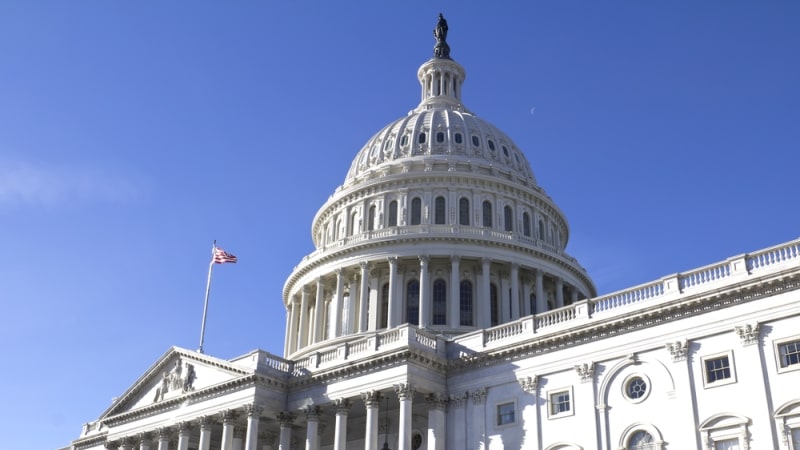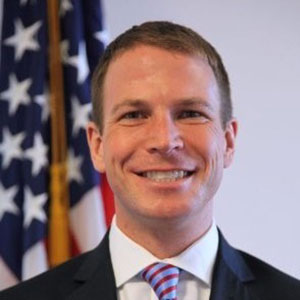
Matthew Cornelius, who for the past 20 months has been a high-energy force – mainly behind the scenes – for a good deal of the IT and cybersecurity legislation that has come out of the Senate Homeland Security and Governmental Affairs Committee (HSGAC), pulled up stakes last week and departed government service.
The D.C. policy veteran resigned as the senior professional staff member for HSGAC Chairman Sen. Gary Peters, D-Mich., whose leadership has made the committee a veritable legislative machine – incorporating ideas and support from both sides of the aisle – on the tech and cyber fronts.

Cornelius brought with him to the committee – and takes forward to whatever the next opportunity is – experience that fit the HSGAC post to a tee.
Those include running the Alliance for Digital Innovation trade group, nearly three years as senior technology and cybersecurity advisor at the Office of Management and Budget, senior advisor to the head of the General Services Administration, and policy advisor at the Treasury Department.
Cornelius, who doesn’t appear to suffer fools gladly but has been known to point a journalist toward some news now and again (thanks!), gave us a half hour following his departure from the committee to talk about his HSGAC tenure, and a wide array of IT and cyber legislative initiatives that remain ripe and likely for action over the coming months.
What’s within that range of solid possibilities? How about FISMA (Federal Information Security Management Act) reform, the SAMOSA Act on management and oversight of Federal agency software, grants reform, and AI legislation.
Cornelius didn’t peep a word about what he’s thinking of doing next, but it wouldn’t surprise anyone if it was something that remained close to meaningful policy action.
MeriTalk: Matthew, you’ve been working in one of the centers of gravity for tech policy/legislation for almost two years, how has it been working for Sen. Peters?
Cornelius: Gary Peters is just an unbelievably smart, thoughtful, and dedicated legislator. I think the reason that HSGAC, especially in the 117 Congress, was so historically productive is that Chairman Peters constantly found new and interesting ways to engage Republicans and get them on board with his ideas.
That’s everything from the incident reporting to FedRAMP reform to all the work we did around AI and acquisition reform. There were constantly ways that we worked very productively with Ranking Member Portman, R-Ohio, and other Republicans. There were bills that Sen. Hawley, R-Mo., cosponsored, that Sen. Lankford, R-Okla., cosponsored, and that Sen. Scott, R-Fla., sponsored.
The interesting thing about HSGAC – set aside border issues – is it’s one of the most bipartisan and productive committees around. We had a great team in the majority, you had a chairman like Sen. Peters and ranking member like Sen. Portman who was a former director of the Office of Management and Budget (OMB) and really understood the issues. They both carried a lot of weight and allowed the committee to function very, very well and produce a lot of legislation that became law.
MeriTalk: Sen. Peters led a lot of legislation out of the committee, how does that stack up historically?
Cornelius: If you look at the historical data, Chairman Peters was the single most productive member of Congress in getting standalone pieces of legislation passed since Sen. Kennedy, D-Mass., in 1980. And he actually blew Sen. Kennedy’s numbers out of the water – I think he was like 50 percent more productive. So, terrific work by the staff, the chairman, and his personal office.
MeriTalk: What’s your view on the 118th Congress?
Cornelius: As we move into the 118th Congress you know, things are much slower in the pace of legislation at the committee level. It’s a much different terrain with Sen. Paul, R-Ky., as ranking member.
But I do think that there are a few areas where – both on the committee or just broadly in Congress – that Chairman Peters and HSGAC will play an influential role. For one, I think HSGAC will take the strongest leadership role into any AI legislation that comes out.
Majority Leader Schumer, D-N.Y., has talked about this – there are many members that have lots of ideas on what can be done in AI, but HSGAC has been the leader on AI legislation and oversight over the past few congresses and I think whatever new efforts you’re going to see from Congress and AI is really going to be led by Chairman Peter, so that’s a place where I think there’s some bipartisan opportunities.
MeriTalk: How has the climate changed since the 117th?
Cornelius: The COVID-19 spending spigot has been turned off. And because of that, as we go into debt ceiling negotiations and appropriations season and everything else, we’re going to have to think about ways to cut spending smartly. There are a lot of dumb ways to cut spending. But there are also some very smart ways to cut spending.
One bill that I worked on and that Chairman Peters has led that I think will end up getting passed this Congress is the Strengthening Agency Management and Oversight of Software Assets Act, the SAMOSA ACT, which will require agencies to do a comprehensive assessment of all software bought, used, deployed, developed, or active anywhere in agency environments.
I think that’s going to lead to agency CIOs and chief data officers having the kinds of the kind of data and information they need to make smarter, better buying decisions, when it comes to software and how they’re going to modernize effectively, and how they’re going to rationalize their applications and databases. And I think that can lead to tremendous cost savings as well as improve cybersecurity and performance with agency IT so very bullish that that will happen.
MeriTalk: Where else should we be looking for movement this year?
Cornelius: I think customer experience will continue to be something highlighted, Sen. Lankford has been a good partner with Chairman Peters on that. I think you will continue to see hearings on that. I think they will continue to drill down into what the administration is doing to drive better digital services outcomes on behalf of the American people. I think that will be a key issue that goes forward.
And then you just saw it this past week on the committee when they held the first of what will probably be many hearings on grants modernization. We tend to focus a lot on how the federal government buys things, we focus on acquisition and procurement issues, but there’s more money that goes out the door every year in federal financial assistance than there is in acquisitions – by about a 30 or 40 percent delta.
So if we’re really serious about making sure that state and local governments and nonprofits have access to the funds necessary to deliver programs and benefits to communities in need, we need to make sure that a lot of that administrative burden and red tape that has been put in place for program managers in the grants process over the past decade or two, that we can streamline that.
Every year the National Defense Authorization Act (NDAA) has a massive section on procurement reform, and we’re constantly tinkering both with the Defense Department and government wide acquisition authorities in every NDAA. But we don’t do that when it comes to financial assistance in grants programs, and it’s really a big blind spot.
I’m proud that Chairman Peters and the committee have started to look at that and want to think about ways that we can reduce administrative burdens, give state and local governments the flexibility they need to spend money effectively, and deliver better outcomes at lower costs for citizens.
So if you think about the software issues, the grants issues, the AI issues, those are the silver linings to what might otherwise be a fairly black cloud over this Congress, which will be slower and will be less productive. But it doesn’t mean that they can’t pass some very substantive legislation and conduct some great oversight that gets bipartisan support.
I think Chairman Peters and Ranking Member Paul, their relationship is growing. I think he has a very good relationship with Chairman Comer, R-Ky., on the House Oversight and Reform Committee, and at the end of the day, things like cybersecurity, better spending outcomes, better data, IT modernization, those are things that bind Democrats and Republicans together. I think you will continue to see a lot of movement both in the legislation and in oversight as we move forward.
MeriTalk: FISMA reform came so close to happening in the last Congress, what’s your view on further interest in Congress this time around?
Cornelius: I think there are a lot of opportunities in FISMA. I think the cybersecurity space is going to be a very interesting space for HSGAC generally.
Chairman Peters has already introduced a couple of cybersecurity bills that he wants to move – there’s one on health care cybersecurity, and they had a hearing on that earlier this year. Just this month they rolled out a new satellite cybersecurity bill. I think you’re going see the committee both look at critical infrastructure and sectoral cybersecurity.
I think as Chairman Comer, who has his hands full with a lot of investigations right now, once he and his team can start thinking more proactively about legislation that they want to take up, they were very involved in FISMA negotiations last Congress. We came very close on the committee to getting that passed. So I know that Chairman Peters has spoken about this publicly – FISMA is his top cybersecurity priority to get done this Congress and I think he and Chairman Comer were sort of co-leads on that last Congress.
Once they get Ranking Member Paul and Ranking Member Raskin, D-Md., on the House side up to speed I think there’s a real possibility we get something done. We were – a lot of folks don’t see this publicly – but things were very close with FISMA legislation in the 117th Congress. You were probably on the one-yard line last Congress and just couldn’t get it there.
So it’ll take a little bit of time to get the two new ranking members up to speed, but I think Chairman Comer and Chairman Peters both want to see this passed, they both helped write the bill last Congress, and we should see a lot of activity on that as this year moves forward.
MeriTalk: What’s next for you?
Cornelius: If I if I knew I would tell you. I’m just I’m just taking some time off, just traveling, getting relaxed, talking to a lot of folks, but when I when I do figure that out, I’ll be sure to come to you with a scoop on that.
